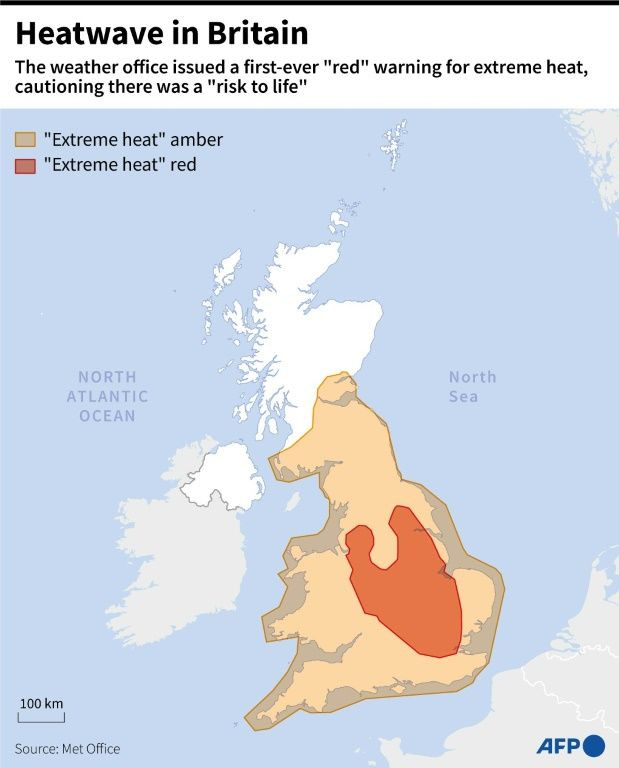After Warmest Night, Britain Braces For Record Heat

Britain was bracing for temperatures to hit 40 Celsius (104F) for the first time on Tuesday after enduring its warmest night on record in a heatwave that damaged some infrastructure and turned the spotlight on political pledges to tackle climate change.
Britain, which can struggle to maintain key transport services in extreme heat or the snow, has been put on a state of "national emergency" alert as temperatures look set to surpass the previous record of 38.7C recorded in 2019.
Transport minister Grant Shapps said it would be many years before Britain could fully upgrade its infrastructure to cope with higher temperatures, after at least two runways showed signs of damage and some train tracks buckled.
"We've seen a considerable amount of travel disruption," he told the BBC. "Infrastructure, much of which was built from the Victorian times, just wasn't built to withstand this type of temperature."
The arrival of a searing heatwave that first sparked wildfires across Europe before arriving in Britain has turned the spotlight on to net zero pledges made by the candidates running to replace Boris Johnson as prime minister.
After Johnson championed the move to net zero status when Britain held the United Nations COP26 summit in 2021, some of the candidates to replace him have appeared more lukewarm and rated other challenges facing the country as their priority.
One candidate, Kemi Badenoch, said she believed in cutting carbon emissions but not in bankrupting the economy to do so.
Ed Miliband, a former leader of the opposition Labour Party who leads its response on climate change, said he found the political debate deeply worrying.
"You've got candidates who seem to be falling over each other, not to run towards net zero commitments, but to run away from them," he told BBC Radio.
DO NOT TRAVEL
Temperatures in Britain hit 38.1C in Suffolk on Monday and were forecast to rise above 40C later on Tuesday.
The heat forced Network Rail to issue a "Do Not Travel" warning for services heading north out of London while it tweeted a picture on Monday showing a rail with a kink near the capital.
London's Luton Airport suspended flights after a surface defect was found on the runway, and operations had to be diverted from the Royal Air Force's Brize Norton, with a media report suggesting the runway had partly melted.
The public were also warned not to swim in open water to cool off, after reports of fatalities.
At least one major zoo, at Chester, said it would close while Bristol Zoo said squirrel monkeys, kea parrots and red pandas were being fed frozen ice lollies filled with vegetables, leaves or mealworms.
In central London, tourists from around the world continued to visit key attracts such as Buckingham Palace and the Tower of London. At Trafalgar Square many stopped to dip their hands, feet and head in the fountain pools.
Reinier van den Heurel, who lives in Bucharest, said he was choosing his route through the capital, based on the sun. "You walk from shadow to shadow, anywhere that you have to stay in the sun for a long time, that's off limits," he told Reuters.
(Writing by Kate Holton; Editing by Raissa Kasolowsky, Alexandra Hudson)
© Copyright Thomson Reuters 2024. All rights reserved.











